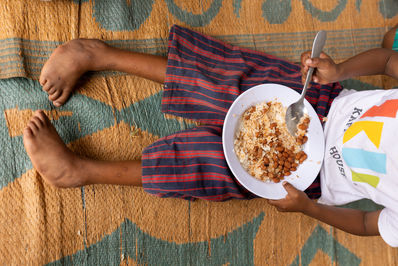About
The Kafika House, formerly "The Plaster House," is an organization headquartered in Arusha, at the foot of Mt. Meru, and forms a network of rehabilitation centers with affiliated, cooperating children's clinics. The rehabilitation centers are located in Arusha, Karatu, and Moshi. These facilities are unique in Tanzania and create a safe space for people with disabilities in Tanzania.



The founder, Sarah Rejman, had the vision in 2006 to create an oasis for children with disabilities. Besides medical correction, her focus was on creating a safe place for the young patients that gives them time for rehabilitation. At the same time, the children should also experience the necessary affection through contact with other children and the provision of education. Each year, the Kafika Houses accommodate over 1000 children who need treatment.
For Sarah Rejman and her team, adequate care means being there for the children to a great extent even after the treatment. Therefore, it is necessary to extend the range of treatments across the whole of Tanzania. In 2023, a branch of the Kafika House was opened in Karatu, and another branch in Moshi in 2024. The plan is to expand the services nationwide and to open a dedicated Surgical Center where the children can be adequately operated on.
What makes the Kafika House so unique?
The Kafika House makes a unique contribution to the care of children with operable disabilities in Tanzania. Disabilities are still heavily stigmatized in many parts of Tanzania, so many parents of children with disabilities do not seek professional help but often hide the children in villages instead. The Kafika House team reaches even very remote regions of Tanzania with the "Outreach" team, educating the community about disabilities, their causes, and treatment options.
When children find their way to the Kafika House, they are lovingly welcomed and examined by the Medical Team. It is then determined whether the child can be accepted into the Kafika House program. If the child is accepted, they will be taken care of in one of the three facilities. Here, preliminary examinations are carried out, and the child is operated on in a cooperating clinic.
The cooperating clinic specializes in operating on children with physical disabilities and deformities. Often, these are interventions that can typically be performed immediately after the birth of a child in our Western, modern world. This can mean that the child may be able to lead an unburdened life almost from birth. In developing countries, like Tanzania, these opportunities are not available. Through the surgeries, the children are given the chance for a significant improvement in quality of life upon successful operation and rehabilitation. Moreover, it enables the children to participate in social life in the future and even start a family.
After the operation, the child is readmitted to the Kafika House for complete rehabilitation until recovery is achieved. The rehabilitation stay lasts on average 3-6 months. During this time, the children's parents can live in the Kafika House, if possible. If this is not feasible due to personal challenges, House Mums take care of the children during the rehabilitation period. Rehabilitation is particularly crucial for treatment, as children who are sent home immediately after surgery have hardly any chance of complete recovery. The living conditions of many children in Tanzania cannot be compared with those of a child growing up in Germany. Especially hygiene deficiencies and the fact that many children must already work physically would prevent recovery.
The most common diseases treated at the Kafika House are (by frequency, 2022):
-
Fluorosis
-
Hydrocephalus (water on the brain) and Spina bifida (curvature of the spine)
-
Clubfoot
-
Burns of all kinds
-
Cleft lip and palate
-
Other orthopedic problems
-
ENT diseases
-
Osteomyelitis (inflammation of the bone marrow)
Quelle: Annual Report 2022, The Plaster House
Donations and transparency
How are the donations used? A valid question, as one wants to ensure that the money really reaches its destination and is used for its intended purpose. The Kafika House is an organization that places great value on transparency and discloses its income and expenses in its Annual Reports. These are accessible on the website starting from 2012.
This clip shows the story of a young patient from a child's perspective. It highlights how significant the visit to the Kafika House is for the child's future life.













